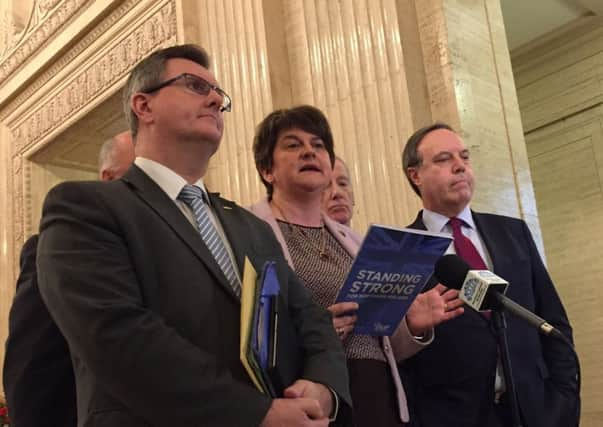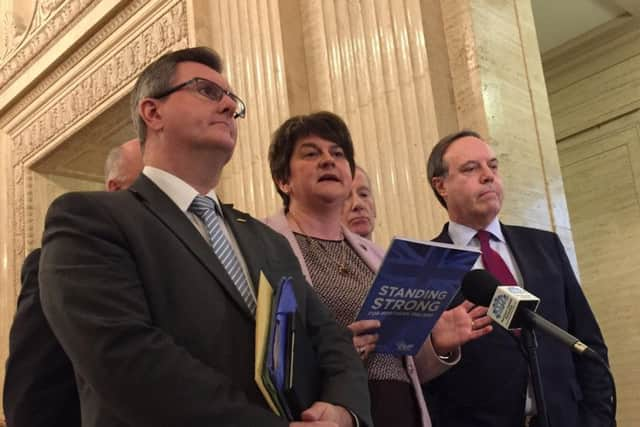DUP had role in collapse of Brexit deal - the question is what role?


There is no question that the DUP played a role in the collapse of what seemed to be a Brexit deal yesterday; the question is what that role was and how much the party knew before yesterday’s critical leak of the proposed deal.
It is difficult to conceive that the prime minister would break off from a decisive discussion with Jean-Claude Juncker to phone Arlene Foster in Belfast if the DUP’s views were not becoming critical to what was being discussed.


Advertisement
Hide AdAdvertisement
Hide AdBut it also seems hard to believe that Theresa May would have failed to consult Mrs Foster, the leader of Northern Ireland’s largest political party, ahead of striking a deal on matters of the most fundamental constitutional significance for Northern Ireland.
It seems doubly unlikely that the prime minister would not bring the DUP with her on an issue of this importance when she is running a minority government dependent on the DUP, which has been vocally clear about the issue in question. Over recent months, the DUP has made much of the level of engagement which it has with the highest levels of the government, and in particular with David Davis, with whom its MPs hold regular meetings.
So did the DUP agree to some wording around the idea that Northern Ireland could retain regulatory harmony with the rest of the island of Ireland, only to get cold feet once news of the proposal leaked out?


After the proposed deal leaked yesterday morning, there was a period of several hours – a lifetime in the age of political negotiations against the backdrop of social media and rolling news channels – in which unionist opinion was hardening against it, with everyone from the UUP leader, the TUV leader, Lord Trimble and even some DUP members either openly denouncing the deal or cautioning against it.
When I asked the DUP last night if it had been consulted on the issue, a spokesman did not directly answer the question either way but stressed that the party had “regular discussions on all of these things” with the government and that there was an “ongoing dialogue” between the DUP and the government on Brexit.
Certainly there was a clear undertone in Taoiseach Leo Varadkar’s statement last night that something odd had gone on, with his suggestion that the UK government had agreed to the text on Northern Ireland only to withdraw that after Arlene Foster’s statement during the meeting with Mr Juncker, leaving him “surprised and disappointed”.
There is a more Machiavellian possibility. It could be that the DUP, knowing that having argued for Brexit and that because of its MPs’ leverage it is vulnerable to being blamed for any deal which is seen to undermine the unionist position, has calculated on something else: a very public flexing of its muscles now, allowing it to point back to how it stopped this deal if slightly more advantageous terms can be reached.
And although this doesn’t look good for Mrs May, she potentially gains at least one card here: being able to say to Brussels that the Northern Irish question is not as simple as some there have presented it to be, and she is prepared to be more flexible than some of the Northern Irish parties, who she needs to bring with her.
This article originally featured on our sister site, The Newsletter.
